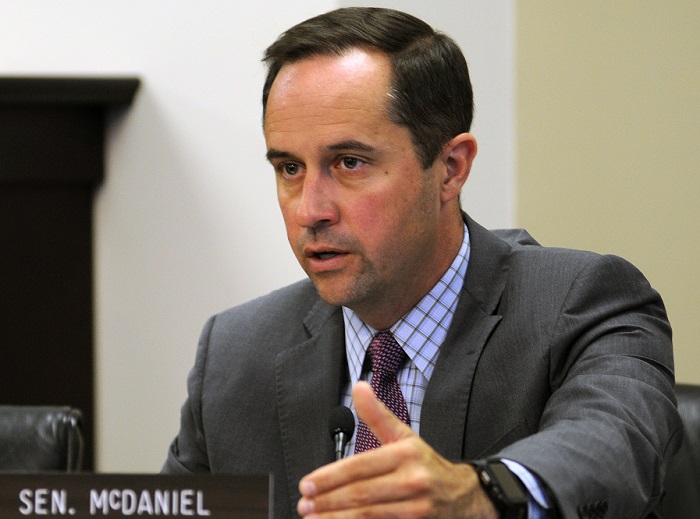FRANKFORT, KY – Paramedics and emergency medical technicians in Kentucky are savings lives –and saving their agencies money – by teaching frequent users of emergency medical services how to take more control of their health and call 911 less.

Sen. Christian McDaniel, R-Taylor Mill, commenting on EMS utilization during meeting of the Interim Joint Committee on Local Government
The change is underway as part of the Community Paramedicine Pilot Program initiated by the Kentucky Board of Emergency Medical Services. KBEMS Executive Director Michael Poynter told the Interim Joint Committee on Local Government today that the program, in place in six counties, is aimed at preventing costly ambulance runs and hospital stays.
In Fayette County, which is part of the program along with Jefferson, Calloway, Montgomery, Warren and Oldham counties, Poynter said there have been 1,000 fewer EMS runs since Lexington joined the pilot program in February.
“If we average that out, they’ve actually saved $750,000 in four months from the lack of EMS runs that they didn’t have to make,” said Poynter. “And if the patients were hospitalized, (savings would be) $7.5 million.”
Program savings so far have come from working with three types of citizens, said Poynter: “super users,” who he said are citizens who may call 911 as often as 10 to 20 times per month; discharged hospital patients who risk readmission; and people who need instruction in prevention and wellness. One-on-one instruction on how to give oneself a breathing treatment at home, for example, can reduce runs significantly, he said.
“In the past eight months (one) patient had called EMS/911 20 times,” Poynter said. After a one-on-one visit in their home and follow-up communications through the Community Paramedicine program, he said, “they had not called in 45 days.”
The program is also helping to address the state’s opioid epidemic, Poynter said. He shared with lawmakers the story of an addict in Lexington who was able to be placed in a rehab facility thanks to the program.
“They helped find this patient a rehabilitation facility, and (the patient) has not made a 911 call since they made that contact with this patient,” he told the committee.
In regards to the “super user” part of the EMS cost equation, Sen. Christian McDaniel, R-Taylor Mill, asked how costs for “additional or unnecessary” use of EMS services can be recouped.
“If we’re clogging our capacity with people, what are they doing to compensate for their additional use of that capacity? Additional and unnecessary?” McDaniel asked.
Part of the answer, Poynter said, is savings the program yields by reducing calls from those users. Yet McDaniel said money to make various runs is still being spent and not reimbursed.
“There are folks who are using the system, abusing the system frankly – folks who just need a ride from A to B, people who need somebody to talk to… And they’re utilizing capacity and they’re utilizing highly-trained personnel. There’s got to be a way to charge them for that use, to recover some of the money that we’re expending,” said McDaniel.
KBEMS Deputy Director Chuck O’Neal responded that reimbursement for ambulance services is based on transport only and set at a fixed amount, with no opportunity to bill a patient for the balance. One possibility, he told McDaniel, is to change the reimbursement model from a transport model to a provider model.
O’Neal said that change could “put more dollars back in those EMS agencies and supplement those EMS dollars.”
Also commenting on utilization was Rep. Michael Meredith, R-Oakland, who said there are individuals who “could get to the emergency room themselves” but know they’ll be seen more quickly if they arrive by ambulance. Meredith said he believes part of that problem is hospital understaffing, whether the hospital is urban or rural.
“I know we’re short-handed on ER doctors in our area… And folks go in with a fairly significant problem, four hours is a long time to wait. It’s a really, really long time to wait,” said Meredith. “I think that’s something as we move forward we need to address in a more comprehensive way.”
Rep. Kelly Flood, D-Lexington, expressed interested in a statistic Poynter shared that shows one in five Kentuckians contacted EMS in 2017. Flood asked how that statistic compares with other states in the region, including those battling the opioid crisis. Poynter said he uncertain but will research the matter.
“I would very much be interested in that dynamic. I recognize ours might be higher, but I’m wondering if it’s similar to our sister states,” Flood commented.
END









